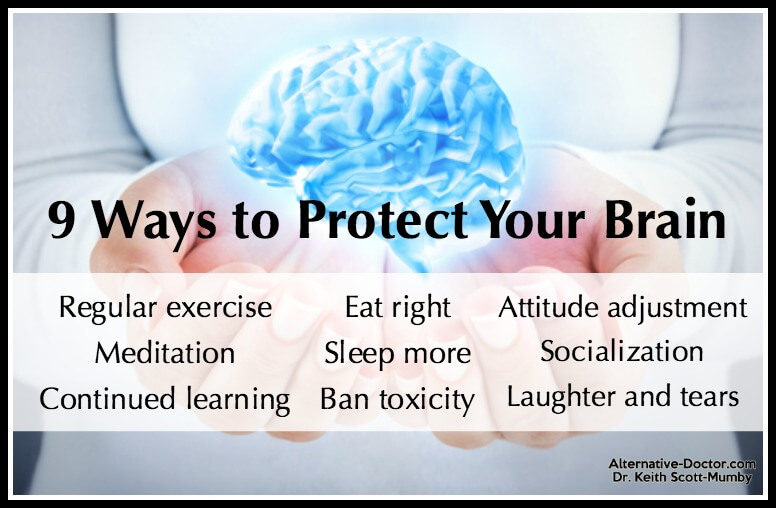No matter your age, protecting your brain health should be a priority. I firmly believe that if parents make this a primary goal in their children’s early childhood, we can turn the tide on the epidemic of neurodegenerative disease.
Yes, preserving cognitive function is more of a pressing topic to people over the age of 60 (as are most diseases and conditions) but there’s no reason to wait until damage is already done! You can actively fight against cognitive decline at every age to lower your risk right now.
The Power of the Human Brain
The brain is so uniquely complicated that scientists still don’t understand how it all works. All that’s truly known is that this organ manages your entire body.
Your brain is responsible for movement, senses, attention span, behavior, intelligence, memories, reason, communication (language and writing skills), spatial understanding, your primary life functions (respiration, digestion, immunity, and heart rate), and so much more.
It is scientifically proven that protecting your brain is largely dependent on diet and lifestyle habits. While some factors such as birth defects or traumatic brain injury (TBI) can influence brain health in ways that are out of your control, the majority of us have full authority over how our brains work now…and how they will continue to work into oldest age.
9 Ways to Protect Your Brain Right Now
1. Regular exercise: You don’t have to be an Olympic athlete or maintain an expensive gym membership to benefit from exercise. Studies show even mild (low-impact) workouts are valuable to your entire body. If you aren’t currently in the habit, start slow. Consider walking, swimming, yoga, tai chi, or deep stretching routines. There are even exercises for people to do in a chair. Utilize the power of the internet to find the (often free) option that’s right for you and get moving!
2. Meditation: The art of stopping and allowing your brain to relax is good for you on many different levels. It’s been proven to lower your overall stress and that means lowering the inflammation in your body. Since unchecked inflammation is the cornerstone of cognitive decline, this is critical. There are many guided meditations to be found online that can teach you how to slow down, breathe, and soothe your brain.
3. Continued learning: This can come in many forms. Reading, watching documentaries, taking an adult learning course, engaging in conversation about topics with which you are unfamiliar, and online puzzle games all help you flex your “brain muscles.” I’d also suggest avoiding most of the programming on current cable stations. Decades ago, when scientists theorized that TV rotted the brain, they weren’t far wrong. Pick something that forces you to think, reason, or engage.

4. Attitude adjustment. It’s not always easy to be optimistic but studies show that men and women who tend to think positively rather than negatively have a lower risk of neurodegenerative disease, heart disease, and cancer later in life. Work to establish mindfulness and gratitude while avoiding resentment, anger, and jealousy whenever possible. It might sound flighty but it’s rooted in facts: how you think really does influence how you feel.
5. Socialization. Not everyone is a “people person.” To that end, it can be difficult for some to establish relationships (romantic or platonic) with others. However, history and science tells us that humans are meant to interact. It’s a basic need that’s wired into our biology. In today’s modern world, we are more connected electronically and increasingly isolated from human contact. Consider joining a class for something you enjoy or want to learn (cooking, pottery, writing, etcetera) to meet others who enjoy the same thing. It’s a small step that can have drastic results.
6. Laughter and tears. Everyone talks about the well-known benefit of laughter on human health and every study basically backs up the power of humor. However, few seem to talk about the cathartic power of tears. Protecting your brain involves many aspects of your emotional health as well as your physical and mental Holding on to past hurts, trauma, and fear can damage you on a level you might not even recognize for decades. I once knew a woman who would turn on a movie she loved that happened to be horribly sad so she could engage in what she called “a good cry.” She swore it released a lot of negativity that could build up gradually over time. That’s definitely a good thing.
7. Eat right. This is probably the most difficult change for people to make and it represents about 80% of your success in remaining healthy, preventing disease, and slowing the signs of aging. This is particularly important for your brain. No matter what else you do, add brain protective foods to your diet right now in the form of eggs, fatty fish, nuts and seeds, coconut oil, avocados, and other healthy fats. Wherever possible, eliminate the garbage…especially high-fructose corn syrup, hydrogenated oils, artificial sweeteners, and foods that come in boxes or bags. If you do nothing else, your diet can have the greatest impact.
8. Sleep more. This is my flagship topic and I see mainstream media is finally touting the importance of sleep in their reporting. (It’s about time!) Sleep deprivation destroys your brain gradually over time. There’s a reason it’s a known method of torture. Getting 8 hours of quality sleep is especially critical to cognition and lowering your risk of dementia later in life. Lack of sleep makes it impossible to think clearly, anchor your memories, remain calm, and avoid a higher risk of diabetes, heart disease, cancer, obesity, and so much more.
9. Ban toxicity. Whether it comes in the form of people, places, situations, or your own personal habits, toxicity kills you by inches. Toxic relationships (personal and professional) damage you gradually over time. They wear you down, beating you up on a cellular level as your brain attempts to insulate you from the negativity. Toxic habits such as smoking, substance abuse, excessive alcohol use, and poor eating habits cause damage much faster and definitively. The inflammation caused by toxicity (in all its forms) is detrimental to your physical, mental, and emotional health. One day at a time, one area of your life at a time, you need to remove the toxins.
When you really think about protecting your brain, you’ll realize it’s not that difficult. A small change here and there, consistently, will drastically improve your overall cognition. Once your brain works at the peak levels it’s meant to maintain, your entire life will feel different.
Whether you are 20, 40, 60, or 80 – it is never too late to start.




